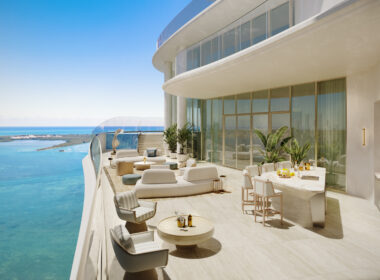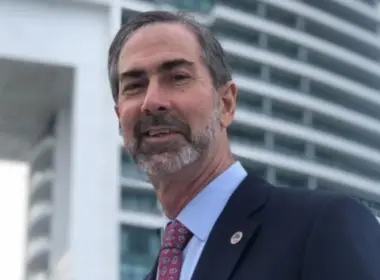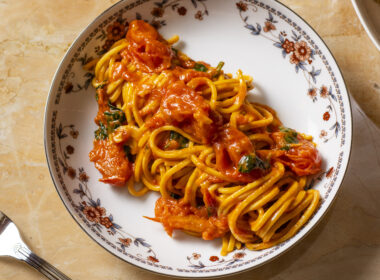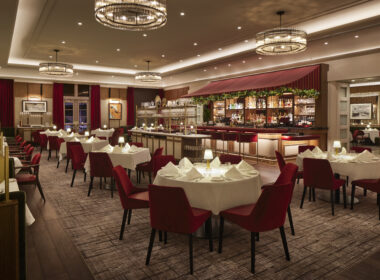The Miami Consular Corps: A Special Report on the Diplomatic & Trade Representatives Who Connect Miami with the Globe.
Sponsored by
The Perspective of Corps Secretary Nabil J. Achkar
Banker Nabil Achkar has been secretary of the Consular Corps of Miami for 30 years and is considered “one of the most revered members of Miami’s international community,” says Manny Mencia, chairman of the Miami World Trade Center. While the official business of the Corps is conducted by an executive committee consisting of the Dean of the Corps (the longest consul in office, currently Consul General Gilbert Boustany of Antigua and Barbuda), Treasurer (now vice president of the Beacon Council Mario Sacasa), Secretary (Achkar), and Corps Adviser (currently the former German Ambassador Volker Anding), operations are run by the Secretary. He serves in this function voluntarily. We sat with the secretary at the Biltmore Hotel and asked him to elucidate the mission and functions of the Consular Corps of Miami.
How did you come to be the secretary of the Miami Consular Corps?
I was an assistant to the consulate of Lebanon many years ago and would represent Lebanon at the meetings. One day I was lucky to be elected secretary, following the end of the term of my colleague (the Lebanese consul general). I was elected and I’ve been in that position ever since.
What are the primary functions of consular officers here?
Mainly to promote the country that they represent, economically and culturally. The consul [will] try to bring the airline of his country here, to have a bank(s) from his country here, to have commercial exchanges, to take groups of businesspeople to their country and vice versa. In the past, people thought the consul was somebody who gave you a visa and extended the validity of your passport. It’s not [just] that anymore. It’s really to be a commercial attaché, to be the representative of all the products of that country.
What makes Miami special as a city for consulates?
We have, for example, a protocol department at the airport, which is extremely important to us… the consuls get to know this office, which takes care of all the officials that come to Miami. Very few international airports have this service. They [the officials] are welcomed officially, and they are treated like kings… let’s say the foreign minister of the country is arriving, or the ambassador; there will be somebody at the plane welcoming them, so they don’t have to wait in line….
How important is Miami as a posting for consular officers?
There are almost 80 consulates here, which is one of the largest numbers for a U.S. city. To show you the importance of Miami, many countries appoint Miami consul generals who have already reached the rank of ambassador. Some of them were ambassadors in another country and accepted [the position of] consul general in Miami. This is how important Miami is in the eyes of those governments.
How has the consular presence in Miami changed?
Years ago, Miami had very few career consuls. It was mainly a few honorary consulates to represent the interest of their countries. Then suddenly these countries noticed that Miami was a very important place. So, they elevated the representation to a consulate general, with career diplomats. France, England, Italy, Japan, Germany, all these were small honorary consulates, and then [Miami] became very important. All of Central and South America is [now] represented, and most of Europe – all of Western Europe and some of Eastern Europe. It gives you an idea of the importance that Miami took over the years.
What is the role of the Consular Corps?
In our [consular corps] meetings, we always try to introduce consuls to leaders on the local and state level, so they know who to deal with… We try to [have consuls] meet the head of the airport, the heads of the ports, the head of the police, the mayor of the county, the mayor of the city, people from the State Department, all the people that consuls need to deal with. This is the function of the Consular Corps. It’s also to get people together to know each other. When you have a new consul general arriving, he doesn’t know his colleagues. A consular [corps] luncheon is an opportunity for him to meet 20, 30 or 40 of his colleagues.
How important is promoting trade for the consulates?
Very important. For example, the French Consul General’s official title is Consul General of France and Trade Commissioner. Most of the countries represented here have a trade office. Some are within the consulate, some are outside of the consulate, but they work hand in hand… And they will put [your company] in contact with businesses that are in that same field. And besides that, they do plenty of missions. They take people to their countries and receive people from their countries promoting their economic activities.












